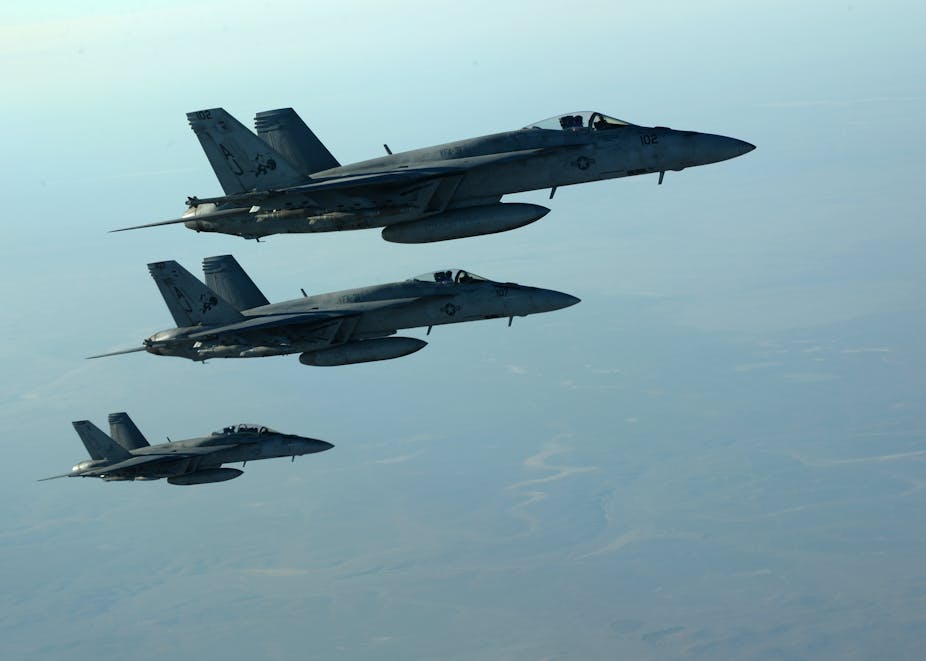Just over a year after the UK parliament was recalled, only to vote against military action in the Middle East, it has again been summoned to approve the use of force in the region.
David Cameron has confirmed that MPs are to return from their party conference break to vote on joining the US, France and five Arab states in carrying out air strikes against Islamic State in Iraq.
Last year, parliamentarians voted no to taking action in Syria. They warned that the public was tired of Britain entangling itself in military commitments and that air strikes would not resolve the area’s political problems. They argued the UK’s national security was not directly threatened and that other states in the proximity needed to step up and take responsibility for the crisis on their doorstep. All of these arguments continue to be relevant.
As we prepare for intervention again, the same political dividing lines are being drawn. Voices on the left are decrying Western imperialism – although in Barack Obama they have had five years of the least militaristic president in living memory. Ed Miliband continues his obsession with legal technicalities instead of relying on his political judgement, while Cameron tries to portray this as a threat to national security, even though the evidence to suggest that the UK will be directly attacked by foreign fighters is miniscule.
Meanwhile, far too little attention has been paid to regional actors and their role in facilitating the rise of Islamic State. Western involvement has certainly not been helpful but the primary blame for this crisis has to fall on political actors in the region itself. In a part of the world known for the cynicism of its politics, the rise of Islamic State is a low point of irresponsible leadership.
Local inaction
In Syria, both the government and the Free Syrian Army have at times apparently co-operated with and facilitated the spread of IS. The Assad regime focused its military efforts on the secular Free Syrian Army until recently and avoided direct confrontation with the Islamist factions. It even purchased oil from the militants, providing a useful source of funding.
At the same time, the Free Syrian Army is alleged to have sold arms to IS and co-ordinated its activities with them in the earlier stages of the conflict. Throughout this period, wealthy individuals from Saudi Arabia and Qatar were funnelling money and arms to the Islamist factions in Syria, partly motivated by a desire to counter Iranian influence.
Then, the group took the chance to expand into Iraq, exploiting the political instability left behind after the US withdrawal. Instead of encouraging national unity, Iraq’s prime minister, Nouri al-Maliki, adopted sectarian policies that alienated the Sunni population and ultimately divided the country along ethnic lines. Favouring group and personal interests over the national, al-Maliki created the opportunity for IS to spread back into Iraq.
Sunni leaders in Iraq also have to accept considerable blame for the humanitarian catastrophe that followed though. Having helped to rid their areas of al-Qaeda from 2006 onwards, they subsequently embraced IS as part of a political strategy to counter the sectarianism of the central government.
Out of this mess, the Kurds seemed to be the only group willing to resist the spread of IS and protect civilians of all faiths from its attacks. But even then, the Kurdish retreat from Sinjar in August was seen by some as a ploy to force the US to increase its support. The local population were apparently assured of their safety and not told to evacuate when the Kurds left.
The result was a humanitarian disaster. Thousands of Yazidis were stranded in mountainous areas and hundreds killed by advancing IS fighters. If this was a political strategy by the Kurds, then it was a perfectly executed operation. European and US funds and weapons began to flow and US air strikes were deployed.
Over in Turkey, the government had vocally encouraged opposition to Assad but failed to support the more moderate elements of the Syrian opposition. It allowed foreign fighters to freely come and go across its borders and refused to allow its bases to be used by other NATO members to attack IS. Fear of Kurdish separatism has also led Turkey to hamper efforts to support Kurdish actions against IS. Its reward has been the release of 49 diplomatic hostages, although this is also likely to have been facilitated by a prisoner exchange.
Beyond bombs
As a result of all this, IS has been able to spread its influence over an area the size of Britain, provoking the worst refugee crisis in recent history. Around 9m refugees have been internally displaced or fled Syria and thousands have been killed or brutalised in IS-held territory.
The international community is finally taking action, but the region’s actors must do more to resolve their differences instead of relying on the US or the UK to step in whenever trouble arises.
Although military support may be needed now things have gone this far, Western governments should in future encourage responsible political leadership in the area. They should call out states when they act irresponsibly. There also needs to be a real regional commitment to ending support for Islamist movements worldwide.
Political reform and a co-ordinated approach to military security are the only long-term solutions to this crisis. The US is expected to be energy independent by 2035 so its commitment to providing security in the region cannot be relied on indefinitely. Governments and other high-level groups must be prepared for their future appeals to be answered with much less enthusiasm, if at all.
If Britain really wants to aid this process, it might be more constructive to spend money and effort on supporting political reform, building responsible leadership and increasing security co-operation in the region rather than tokenistic military gestures.

